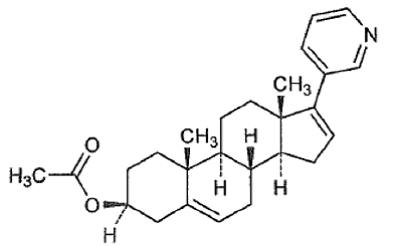Abiraterone

Hormones are chemical substances that are produced by glands in the body, which enter the bloodstream and cause effects in other tissues. The use of hormone therapy to treat cancer is based on the observation that receptors for specific hormones that are needed for cell growth are on the surface of some tumor cells. Hormone therapy can work by stopping the production of a certain hormone, blocking hormone receptors or substituting chemically similar agents for the active hormone, which cannot be used by the tumor cell. Different types of hormone therapies are categorized by their function and/or the type of hormone that is affected. The growth of prostate cancer is stimulated by male hormones (androgens / testosterone). Decreasing the production of these hormones is critical in helping men fight prostate cancer. Androgens are primarily made by the testicles and adrenal glands. However, in men with advanced prostate cancer, the metastatic tumors themselves have the capability to produce testosterone. Generally, prostate cancer responds to treatment that decreases androgen levels. Many androgen deprivation therapies, decrease androgen production by the testicles but do not affect androgen production elsewhere in the body, such as the adrenal glands or in the tumor.
Zytiga® works in a different manner than other androgen deprivation therapies. Zytiga® interferes with an enzyme that is expressed in testicular, adrenal, and prostatic tumor tissues and is required as part of the body’s androgen producing process. Because of this interference the amount of androgens produced are decreased. Zytiga®, blocks androgen production at three sources; the testes, the adrenal glands, as well as from the tumor itself.
Zytiga is usually taken once per day while also taking prednisone two times per day. Follow all directions on your prescription label. Do not take this medicine in larger or smaller amounts or for longer than recommended.
Your prednisone dosage needs may change if you have surgery, are ill, or are under stress. Do not change your medication dose or schedule without your doctor's advice.
Take this medicine on an empty stomach. Do not eat anything for at least 2 hours before you take Zytiga and for at least 1 hour after you have taken the medicine.
Do not crush, chew, or break a tablet. Swallow the tablet whole with a full glass of water.
Your blood pressure will need to be checked often, and you may need frequent blood tests at your doctor's office.
You should not stop using Zytiga or prednisone suddenly. Follow your doctor's instructions about tapering your prednisone dose.
Store at room temperature away from moisture and heat.
Zytiga dosing information
Usual Adult Dose for Prostate Cancer:
Initial dose: 1000 mg orally once daily.
Zytiga should be administered in combination with prednisone 5 mg orally twice daily.
Abiraterone acetate (ZYTIGA) is converted in vivo to abiraterone, an androgen biosynthesis inhibitor, that inhibits 17 α-hydroxylase/C17,20-lyase (CYP17). This enzyme is expressed in testicular, adrenal, and prostatic tumor tissues and is required for androgen biosynthesis. CYP17 catalyzes two sequential reactions: 1) the conversion of pregnenolone and progesterone to their 17α-hydroxy derivatives by 17α-hydroxylase activity and 2) the subsequent formation of dehydroepiandrosterone (DHEA) and androstenedione, respectively, by C17, 20 lyase activity. DHEA and androstenedione are androgens and are precursors of testosterone. Inhibition of CYP17 by abiraterone can also result in increased mineralocorticoid production by the adrenals. Androgen sensitive prostatic carcinoma responds to treatment that decreases androgen levels. Androgen deprivation therapies, such as treatment with GnRH agonists or orchiectomy, decrease androgen production in the testes but do not affect androgen production by the adrenals or in the tumor. ZYTIGA decreased serum testosterone and other androgens in patients in the placebo-controlled Phase 3 clinical trial. It is not necessary to monitor the effect of ZYTIGA on serum testosterone levels. Changes in serum prostate specific antigen (PSA) levels may be observed but have not been shown to correlate with clinical benefit in individual patients.
Important things to remember about the side effects of Zytiga®:
Most people will not experience all of the Zytiga® side effects listed.
Zytiga® side effects are often predictable in terms of their onset, duration, and severity.
Zytiga® side effects are almost always reversible and will go away after therapy is complete.
The following side effects are common (occurring in greater than 30%) for patients taking Zytiga®: fluid retention, increased triglycerides, and increased liver enzymes (AST).
These side effects are less common (occurring in 10-29%) side effects for patients receiving Zytiga®: joint swelling/discomfort, decreased levels of potassium in your blood (hypokalemia), peripheral edema (swelling of the hands/feet), muscle aches/discomfort, decreased levels of phosphorus in your blood (hypophosphatemia), hot flashes, diarrhea, urinary tract infections, cough, and increased ALT (liver enzyme).
